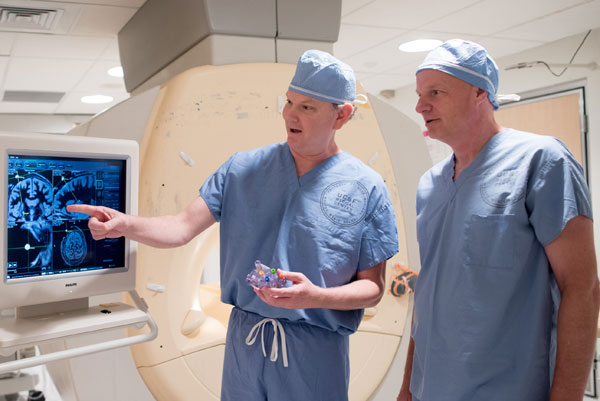Gene Therapy Trial for Parkinson's Disease Uses Intra-Operative MRI-Guided Monitoring

Parkinson’s is a disease that develops in part of the midbrain known as the substantia nigra when the cells producing dopamine start to die off. (Dopamine is a neurotransmitter that controls movement.) In the earlier stages of Parkinson’s, symptoms are more subtle and include difficulty making facial expressions, stiffening of the limbs and stooped posture. Symptoms are usually held in check by the drug levodopa. However, as the disease advances, symptoms worsen and levodopa becomes less effective. This is attributed to AADC – a primary enzyme that converts levodopa to dopamine. AADC declines as Parkinson’s runs its course.
Scientists at UC San Francisco have pioneered the use of gene therapy to address this issue. In phase I of this gene therapy trial, they deliver the gene for AADC using an inactive virus. Using a catheter, the gene is infused into a deep brain structure called the putamen through small holes in the skull. The full methodology of the clinical trial was detailed in an article titled ‘Magnetic Resonance Imaging–Guided Phase 1 Trial of Putaminal AADC Gene Therapy for Parkinson’s Disease,’ recently published in the Annals of Neurology.
Intra-operative MRI-guided monitoring was used, allowing scientists to visualize and guide the infusion of the treatment into the brain in real time, to ensure delivery to the area that should provide maximum benefit, said Chad Christine, MD, first author, of the UCSF Department of Neurology and the Weill Institute for Neurosciences. This was the first gene therapy trial for Parkinson’s disease in which this type of monitoring was used.
Alastair Martin, PhD, associate chair for capital projects at the UC San Francisco Department of Radiology and Biomedical Imaging was a co-author on this research. Chad Christine, MD was first author. Neurosurgeons used a technique developed by Krystof Bankiewicz, MD, PhD of the UCSF Department of Neurosurgery for the study. Other authors from UCSF include Marin Thomas, MS and Paul Larson, MD, both of the UCSF Department of Neurosurgery.
Read more in UCSF News.
